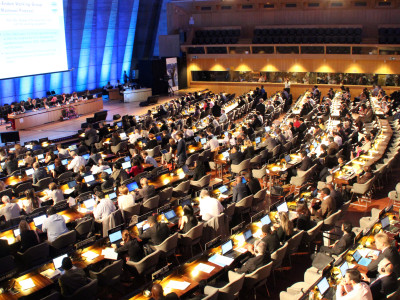Climate Policy
Obama’s Public Lands Conservation Legacy
Progress, but still much more to do
President Obama has gotten some high praise lately from the New York Times editorial board, and this op-ed from Prof. David Brinkley, a presidential historian at Rice noted for his biography of President Theodore Roosevelt. Brinkley compares Obama favorably to Teddy Roosevelt for his conservation legacy. The specific recent actions by President Obama that prompted …
Continue reading “Obama’s Public Lands Conservation Legacy”
CONTINUE READINGLibertarian Candidate Endorses a Carbon Fee
Gary Johnson has put his weight behind
In an interview in Alaska, Gary Johnson endorsed the idea of a fee on carbon emissions. Here’s what he had to say, according to E&E News: “Johnson described his “free market approach” to global warming to the Juneau Empire in an interview published this weekend. He said his plan would include a fee, “not a …
Continue reading “Libertarian Candidate Endorses a Carbon Fee”
CONTINUE READINGBush, Nader, and the Lost Years of Climate Policy
Actions by these two very different men set climate policy back eight years.
From 2001 to 2009, the US sat on its hands while the atmosphere filled with carbon. Much of that carbon came from the US itself, at six billion tons per year up to the 2008 crash. The story of how this came to pass is yet to be fully written. It is, in part, a …
Continue reading “Bush, Nader, and the Lost Years of Climate Policy”
CONTINUE READINGClimate Politics as a War of Attrition
Don’t expect a quick end to battles over climate policy. It could be a long war.
It may be a mistake to assume that opponents of climate policy will see the handwriting on the wall and gracefully give way to the inevitable. In politics, decisions are rarely made for all time, and agreements between opposing sides may not be enforceable. In such situations, game theorists have proposed war-of-attrition models for conflicts. In …
Continue reading “Climate Politics as a War of Attrition”
CONTINUE READINGA gift from the Montreal Protocol parties to the Climate Convention
Montreal Protocol parties agree to negotiate amendment to limit HFCs
Last week, the parties of the Montreal Protocol took an important step to broaden their treaty’s chemical controls to contribute to limiting climate change. The chemicals at issue are the HFCs, or Hydrofluorocarbons. (Like the other halogenated chemicals relevant to ozone depletion, the acronym tells you the chemical composition of the class of chemicals. The …
Continue reading “A gift from the Montreal Protocol parties to the Climate Convention”
CONTINUE READINGClimate Fatigue
You might be tired of climate change. But climate change isn’t tired of you.
I gather that people are tired of hearing about climate change. I’m tired of hearing about climate change, too. Sadly, Nature just doesn’t care that much about entertaining us. It’s going to be climate change this year, climate change next year, climate change the year after that . . . But don’t worry, it won’t …
Continue reading “Climate Fatigue”
CONTINUE READINGSome Unsolicited Advice for Tom Steyer
There were a number of efforts by wealthy individuals and/or Super PACs to affect the midterm election results. Most relevant to this blog, Tom Steyer used tens of millions of his own funds to support candidates that he felt would be more supportive of efforts to address climate change. After the election, the media portrayed …
Continue reading “Some Unsolicited Advice for Tom Steyer”
CONTINUE READINGAustralia’s repeal of its carbon tax
A lot of (bad) environmental law news has been coming out of Australia recently. The new Liberal government has attempted to dump dredging spoils on the Great Barrier Reef and open up protected Tasmanian forests to logging. But most importantly, the government has repealed the carbon tax enacted by the prior Labor government. The Australian …
Continue reading “Australia’s repeal of its carbon tax”
CONTINUE READINGSolar power in North Carolina
How the solar industry became successful in North Carolina
When it comes to politics, North Carolina is not California. California is regularly and consistently Democratic at the state and national level. North Carolina is a swing state in presidential elections, has a Republican majority in its delegation to the House of Representatives, and has a state government currently dominated by Republicans. And when it …
Continue reading “Solar power in North Carolina”
CONTINUE READINGHow Scalia Might Have Ended the Best Hope of Killing EPA’s Greenhouse Gas Rules
The Supreme Court may have just eliminated a major legal and political risk to EPA’s greenhouse gas regulatory program
A couple of folks have already written about the UARG decision, and there is surely more to understand about the implications of the Scalia majority decision for future EPA greenhouse gas regulatory efforts. But I want to highlight one key implication of the decision for EPA’s overall greenhouse gas regulatory program. First, it is important …
Continue reading “How Scalia Might Have Ended the Best Hope of Killing EPA’s Greenhouse Gas Rules”
CONTINUE READING







